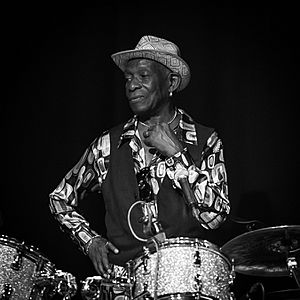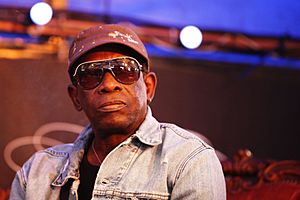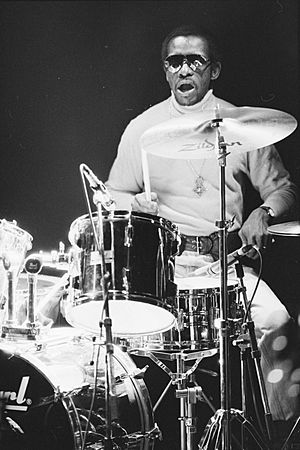Tony Allen (musician) facts for kids
Quick facts for kids
Tony Allen
|
|
|---|---|

Allen at Oslo Jazzfestival 2015
|
|
| Background information | |
| Birth name | Tony Oladipo Allen |
| Born | 20 July 1940 Lagos, British Nigeria |
| Died | 30 April 2020 (aged 79) Paris, France |
| Genres |
|
| Occupation(s) |
|
| Instruments |
|
| Years active | 1968–2020 |
| Associated acts |
|
Tony Oladipo Allen (born July 20, 1940 – died April 30, 2020) was a famous Nigerian drummer, composer, and songwriter. He lived and worked in Paris, France. Tony Allen was the main drummer and music leader for Fela Kuti's band, Africa '70, from 1968 to 1979. He was also one of the people who created the music style called Afrobeat. Fela Kuti once said that without Tony Allen, Afrobeat would not exist. The musician Brian Eno even called him "perhaps the greatest drummer who has ever lived."
Later in his life, Tony Allen worked with Damon Albarn on many music projects. These included the virtual band Gorillaz, the group The Good, the Bad & the Queen, and Rocket Juice & the Moon. Tony Allen's life story was written in his 2013 book, Tony Allen: Master Drummer of Afrobeat.
Contents
Becoming a Drummer
Tony Allen was born in Lagos, Nigeria. His father was a mechanic from Nigeria, and his mother was from Ghana. Tony started playing drums when he was 18 years old. At that time, he was working as an engineer for a radio station.
He was inspired by the music his father listened to, like Jùjú music, a popular Nigerian style. He also loved American jazz and the growing highlife music in Nigeria and Ghana. Tony worked very hard to create his own special drumming style. He studied records and articles by famous drummers like Max Roach and Art Blakey. He also learned from the Ghanaian drummer Guy Warren, who mixed African drumming with jazz.
Tony Allen first played the claves (a type of instrument) with "Sir" Victor Olaiya's highlife band, the Cool Cats. When the band's drummer left, Tony took over the drum set. He later played with other bands like Agu Norris and the Heatwaves.
Working with Fela Kuti and Africa '70
In 1964, the famous musician Fela Kuti asked Tony Allen to try out for his new jazz-highlife band. Fela and Tony had played music together before in Lagos. Fela was very impressed by Tony's unique drumming. He asked, "How come you are the only guy in Nigeria who plays like this – jazz and highlife?" This is how Tony Allen became a founding member of Fela's "Koola Lobitos" band.
In 1969, after a trip to the United States, Tony became the musical director for Fela's band, Africa '70. This band created a new African sound called Afrobeat. It mixed the strong rhythms of soul music with jazz, highlife, and the complex polyrhythms of Yoruba music. Tony Allen created a new drumming style that brought all these different types of music together.
Tony explained how he and Fela created music in the 1970s. Fela would write the parts for all the musicians. But Tony was the only one who created his own drum parts. Fela would ask him what kind of rhythm he wanted to play. Tony said that a good drummer uses all four limbs to play different things at the same time. His drum patterns came from various parts of Nigeria and Africa.
Tony Allen recorded more than 30 albums with Fela and Africa '70. However, by the late 1970s, there were disagreements within the band. Tony felt he wasn't getting enough credit or fair pay for his important role in creating Afrobeat. Fela believed he should get the money for his songs. Fela did support Tony's three solo albums: Jealousy (1975), Progress (1977), and No Accommodation For Lagos (1979). But in 1979, Tony decided to leave Africa '70, and many other band members left with him. Tony wanted to find his own unique sound again.
From Afrobeat to Afrofunk
After leaving Fela's band, Tony Allen started his own group. He recorded the album No Discrimination in 1980. He performed in Lagos until he moved to London in 1984. Later, he moved to Paris, France. There, he recorded music with other artists like King Sunny Adé and Manu Dibango. In 1985, Tony recorded N.E.P.A..
After his time with Fela, Tony Allen developed a new mixed sound. He combined Afrobeat with electronic music, dub, R&B, and rap. He called this new style afrofunk.
In 2006, Tony Allen released a new album called Lagos No Shaking (meaning Lagos is OK). This album was recorded live in Lagos with a full Afrobeat band. It showed Tony's return to his Afrobeat roots after trying out more experimental electronic music.
Later Music Projects
In the song "Music Is My Radar" (2000), the band Blur honored Tony Allen. The song ends with Damon Albarn singing, "Tony Allen got me dancing."
Tony Allen was part of the album Red Hot and Riot (2002), which was a tribute to Fela Kuti. Tony played on a song called "No Agreement" with other artists.
In 2006, Tony Allen joined Damon Albarn, Paul Simonon, and Simon Tong to form the band The Good, the Bad & the Queen. Tony had contacted Damon Albarn after hearing Blur's song that mentioned him. Their first album came out in 2007, and another one, Merrie Land, was released in 2018. Tony and Damon also worked together on the 2012 album Rocket Juice & the Moon.
Tony Allen played drums on two songs for Charlotte Gainsbourg's 2007 album 5:55. He also appeared in the music video for "Once Upon a Time" by the French duo Air in 2007.
His album, Secret Agent, was released in June 2009.
In 2017, Tony Allen released an album called A Tribute to Art Blakey & the Jazz Messengers. It featured a new Afrobeat version of Art Blakey's song "Moanin'". He also worked with Malian singer Oumou Sangaré on her album Mogoya.
A documentary film called Birth of Afrobeat (2019) was made about Tony Allen's life and music. The film was shown at film festivals and later on PBS television in 2020. Tony Allen also performed with Damon Albarn and his band at the Lowlands Festival in 2019.
Tony Allen was featured on the Gorillaz song "How Far?" (2020) with Skepta. He also contributed to seven songs on the album Keleketla! (2020), a project with the Keleketla Library and electronic musicians Coldcut.
Two albums by Tony Allen were released after his death. There Is No End (2021) featured Tony Allen working with rappers and singers from around the world. The second album, The Solution Is Restless, was a collaboration with Joan As Police Woman and Dave Okumu. In 2021, he was also the drummer on April March's album In Cinerama.
Tony Allen's Passing
Tony Allen passed away on April 30, 2020, in Paris, France, from a sudden health issue. Many musicians and producers shared their sadness and tributes. Damon Albarn said, "I will never, ever play with anyone like him again. He is my number one musical teacher."
Discography
- Jealousy (1975)
- Progress (1977)
- No Accommodation for Lagos (1979)
- No Discrimination (1979)
- Never Expect Power Always (with Afrobeat 2000) (1985)
- Too Many Prisoners (with Zebra Crossing) (1987)
- Afrobeat Express (1989)
- Ariya (1998)
- Ariya (remixes) (1999)
- Black Voices (1999)
- Black Voices Remixed (2000)
- Psyco On Da Bus (with Doctor L, Jean Phi Dary, Jeff Kellner & Cesar Anot) (2001)
- HomeCooking (2002)
- Live (2004)
- Lagos No Shaking (2006)
- Secret Agent (2009)
- Inspiration Information 4 (with Jimi Tenor) (2009)
- Black Voices Revisited (2010)
- Film of Life (2014)
- A Tribute to Art Blakey & the Jazz Messengers (2014)
- The Source (2014)
- OTO Live Series (with Jimi Tenor) (2018)
- Tomorrow Comes The Harvest (with Jeff Mills) (2018)
- Rejoice (with Hugh Masekela) (2020)
- How Far? (with Gorillaz and Skepta) (2020)
- There Is No End (2021)
- The Solution Is Restless (with Dave Okumu and Joan As Police Woman) (2021)
- with Fela Kuti
- Fela's London Scene (1970)
- Live! (1971)
- Why Black Man Dey Suffer (1971)
- Open & Close (1971)
- Roforofo Fight (1972)
- Shakara (1972)
- Afrodisiac (1973)
- Gentleman (1973)
- Confusion (1974)
- He Miss Road (1974)
- Alagbon Close (1975)
- Everything Scatter (1975)
- Excuse O (1975)
- Monkey Banana (1975)
- Noise For Vendor Mouth (1975)
- Ikoyi Blindness (1976)
- Kalakuta Show (1976)
- Na Poi (1976)
- Unnecessary Begging (1976)
- Upside Down (1976)
- Yellow Fever (1976)
- Fear Not For Man (1977)
- J.J.D – Live at Kalakuta Republik (1977)
- No Agreement (1977)
- Opposite People (1977)
- Sorrow Tears and Blood (1977)
- Shuffering and Shmiling (1977)
- Stalemate (1977)
- Zombie (1977)
- Unknown Soldier (1979)
- V.I.P. (1979)
- Music of Many Colours (1980)
- I Go Shout Plenty (1986, recorded in 1977)
- Various - Racubah! – A Collection of Modern Afro Rhythms (1999)
- Various - The Allenko Brotherhood Ensemble Part 1 (2000)
- Various - The Allenko Brotherhood Ensemble Part 2 (2000)
- Various - The Allenko Brotherhood Ensemble Part 3 (2000)
- Various - Afrobeat...No Go Die! (2000)
- Ernest Ranglin - Modern Answers To Old Problems (2000)
- Doctor L - Mountains Will Never Surrender (2000)
- Various - The Allenko Brotherhood Ensemble (2001)
- Various - The Allenko Brotherhood Ensemble Part 4 (2001)
- Various - The Allenko Brotherhood Ensemble Part 5 (2001)
- Various - The Allenko Brotherhood Ensemble Part 6 (2001)
- Bababatteur - Awa Band (2004)
- New Cool Collective - Trippin (2006)
- The Good, the Bad & the Queen - The Good, the Bad & the Queen (2007)
- Charlotte Gainsbourg - 5:55 (2007)
- Rocket Juice & the Moon - Rocket Juice & the Moon (2012)
- Various - The Rough Guide to African Disco (2013)
- Chicago Afrobeat Project - What Goes Up (2017)
- Gonjasufi - Mandela Effect (2017)
- The Good, the Bad & the Queen - Merrie Land (2018)
- Keleketla - Keleketla! (2020)
See also
 In Spanish: Tony Allen (músico) para niños
In Spanish: Tony Allen (músico) para niños
- Femi Kuti
- Seun Kuti
 | Janet Taylor Pickett |
 | Synthia Saint James |
 | Howardena Pindell |
 | Faith Ringgold |



